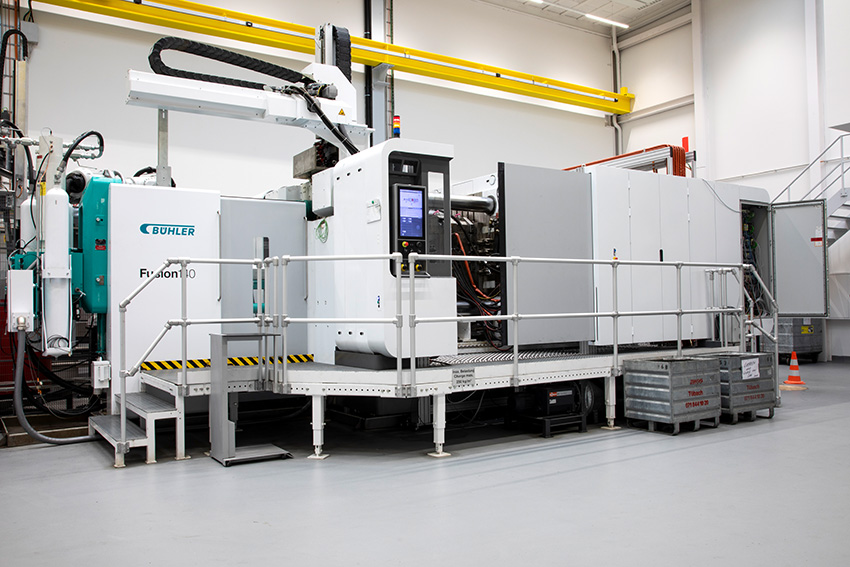‘We wanted to enter the digital future with a state-of-the-art system.’
The Bühler Group successfully migrated its global ERP to SAP S/4HANA with Swisscom. This migration will enable the group to tap into the potential of modern digital technologies along the entire value chain.
Global ERP migration to SAP S/4HANA 3 min.
- Employees: 12,700 worldwide
- Sector: Plant engineering
- Group Headquarters: Uzwil (SG)
- Global ERP migration to SAP S/4HANA incl. adaptation of peripheral systems
- Process optimisation along the entire value chain, particularly in the area of finance
- Creation of a high-performance data source and reduction in data volume
The state-of-the-art SAP S/4HANA system enables the technology group to harness the potential of modern digital technologies such as artificial intelligence and machine learning for corporate management and to implement the vision of smart manufacturing step by step: the efficient networking of people, systems, machines, products and companies along the entire value chain.
Milestone in the digital journey
The Bühler Group was aiming to be prepared for the digital challenges of the future with a state-of-the-art system. In the finance division in particular, it was hoped that the group would optimise its business processes. In addition, the structures in the system, which have evolved over two decades, needed to be streamlined in order to increase transparency. Scalability and harmonisation were only partially achieved. The main objective of the new software was therefore to create a high-performance data source that all employees worldwide can access. For Bühler, it was important that the introduction of the new ERP system ran as smoothly as possible without any major changes to the business processes. The challenge was therefore to minimise the complexity, duration and associated costs of the project. This required a strategic approach and careful planning.
Thorough planning pays off
Bühler made the strategic decision to migrate its global ERP system to SAP S/4HANA and chose Swisscom (Switzerland) Ltd as its project partner due to its many years of expertise and implementation method. The project was implemented using selective data transition, which made it possible to maintain existing processes, transform certain data and make the go-live phase flexible. Selective migration made it possible to reorganise the organisational structure and adapt profit centre structures. The biggest challenge was integrating the new system into the finance division. Bühler optimised the global account structure and simultaneously introduced the new general ledger, the Universaljournal, as well as the new division of financial statements by profit centre. This required in-depth training of employees, which was successfully carried out by the company’s Finance Academy and the ITP Academy. SNP, a subcontractor of Swisscom, ensured that the data integration process went smoothly.
Ready for the digital future
After a transformation phase of 17 months, the Bühler Group started with a stable system that supported the operational processes seamlessly from the outset. Thanks to selective data transformation, the original data volume of 7 terabytes has been reduced by more than half. This contributed significantly to the optimisation of investments in the in-memory databases. With SAP S/4HANA, the company can now benefit from a state-of-the-art backbone for its business processes that enables real-time data and fast reporting, as well as seamless, automated processes. Although the new ERP system is of vital importance, it is only one component of Bühler’s comprehensive digitalisation strategy. This strategic decision enables the technology group to harness the potential of modern digital technologies such as artificial intelligence and machine learning to manage the company. This includes implementing of smart factories, providing a smart customer experience and, above all, transforming into a data-driven enterprise.
Global team spirit essential
A company typically experiences a transformation project of this magnitude only once in its history. A decisive success factor was the extraordinary commitment of all those involved, from the management to the employees. Jemetta-Sammartin is thrilled: ‘This project manifested the impressive Bühler spirit, the passion and the common will of employees around the world to achieve something great.’ Suter adds: ‘The last five days before the go-live felt like we were preparing for a NASA rocket launch.’ In this context, CIO Vidor Kapy emphasises the close collaboration between Bühler and its project partner Swisscom, which was crucial to the success of the transformation.







